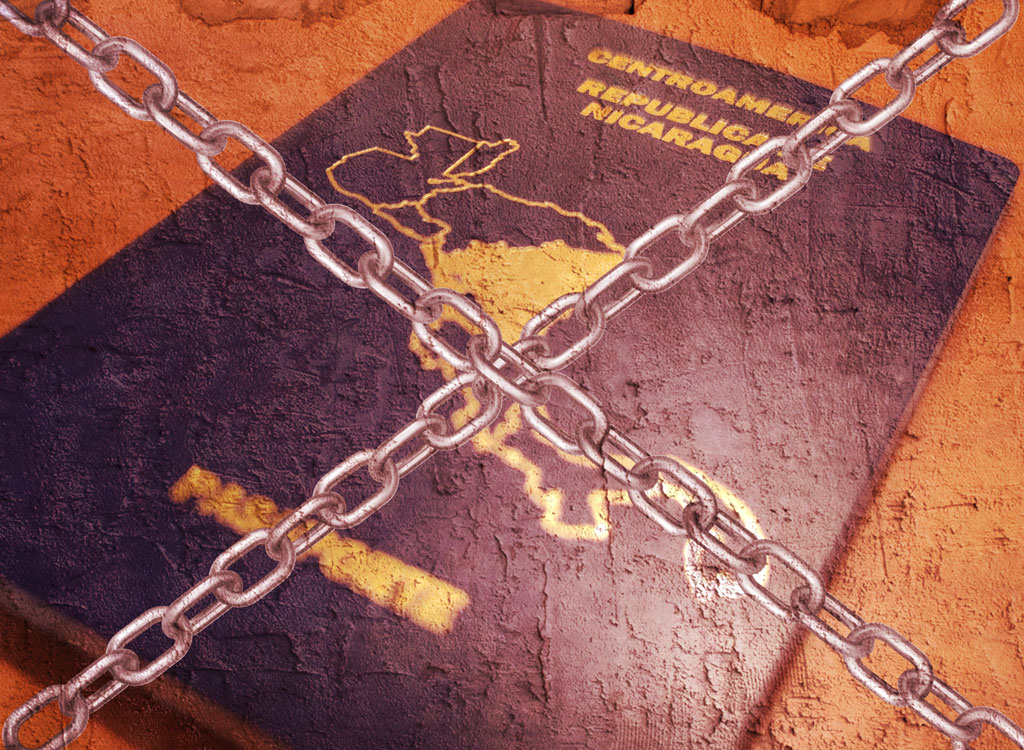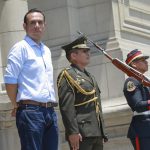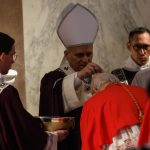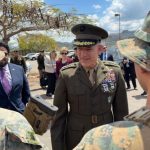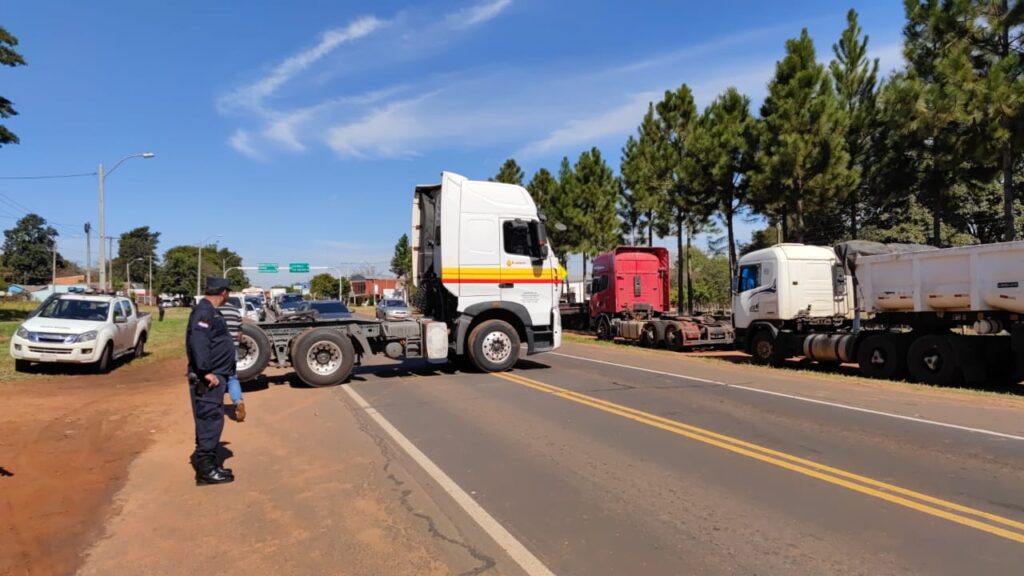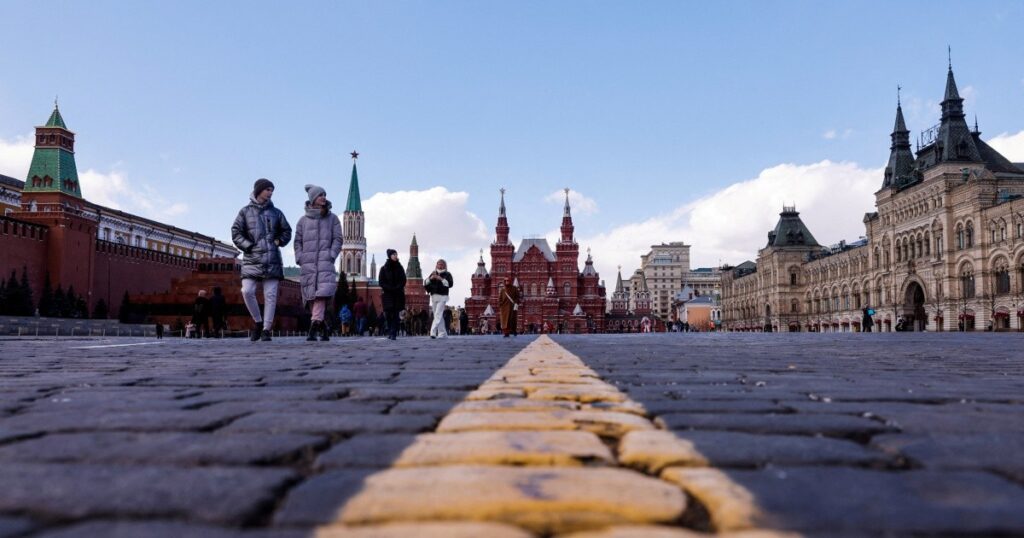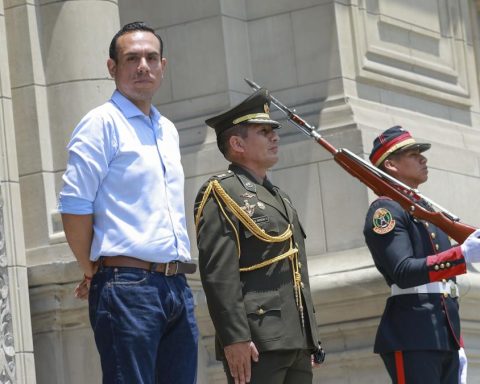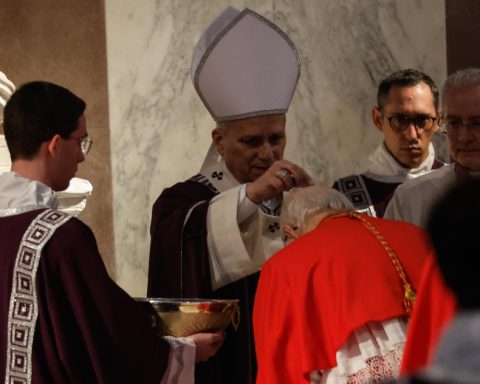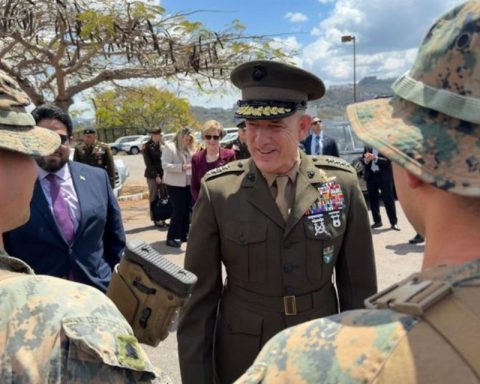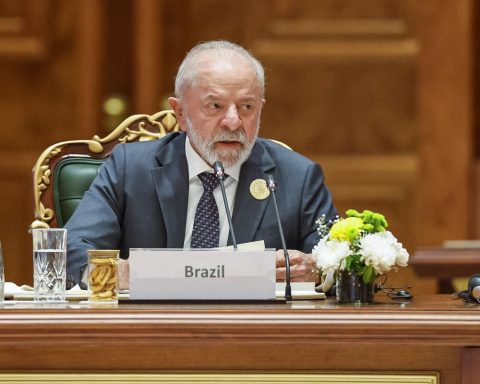The repression has different faces among its executors in Nicaragua: police, military, shock forces, parapolice, prosecutors, judges and magistrates, and it can also be an inexpressive immigration officer.
the marriage of Salvador Espinoza and Xochilt Tapia He was at his home in the San Antonio neighborhood, in Managua, when the Police raided with violence last April during a raid against musicians and music producers who do not sympathize with the regime of Daniel Ortega and Rosario Murillo.
After their capture, they were kept in isolation for nine days in El Chipote prison until they were offered the option of exile as the only way out of their prison situation.
The main executor of the order was the General Directorate of Migration and Foreigners (DGME), a dependency of the Ministry of the Interior, which did not offer any explanation for the departure of the young people on April 21. They went to Hamburg, Germany.
The authorities did not say anything about the other detained musicians, Josué Monroy and producer Leandro Canales, who were sent to El Salvador and Costa Rica, respectively.
The possibility of exile against his critics was raised by Ortega himself in November 2021, in his first speech after his illegitimate re-election, in which he called the political prisoners “sons of bitches of Yankee imperialism”, while assuring that “they should be taken to the United States, because those They are not Nicaraguan. They have no country.”
Before the case of Espinoza and Tapia, which had international repercussions, the DGME authorities were questioned for the confiscation of passports, their non-renewal, the refusal of entry and exit to national territoryalso the denial of exit permits for minors when their parents are subjects of interest to the State and other decisions that jurists consider “illegal”.
This control is extensive to public employees, as has been published months ago, and even to the environment of the presidential family itself, as demonstrated by the recent case of Yadira Leets Marín, former daughter-in-law of Ortegawho traveled indefinitely outside the country, according to the newspaper La Prensa, which was possible after a permit from Murillo.
The former Nicaraguan ambassador to the Organization of American States (OAS), Arthur Mcfieldswho denounced the dictatorship last March, said in an interview with CONFIDENTIAL that one of the measures that the regime could take was to “take away his passport” and “set up a “presidential suite in El Chipote” for him, if he did not maintain the discourse that last November’s voting was free.
In that same conversation, describing that there are public employees with a humanistic vocation, Mcfields added that there are even “some ministers and senior officials who ask for their passports.”
In November of last year, an expansion of the Migration “red list” was reported, including allegedly the former deputy director of the Police, Francisco Bautista Lara, former ambassador to the Vatican.
Moreno: Migration does not have autonomy
Lawyer María Asunción Moreno, an academic and member of the Civic Alliance’s board of directors, says that these acts are a consequence of the institution’s lack of autonomy.
According to official information, the DGME is led by Commander Juan Emilio Rivas Benitezand the inspector general is Commander Ernesto David Moncada Solís, son of the presidential couple’s influential national security adviser, Néstor Moncada Lau, sanctioned for human rights violations.
“In Nicaragua there is no autonomous Immigration and Immigration Office, which makes independent decisions on immigration policy, however, by law said Directorate obeys the orders of the Ministry of the Interior, but, since Ortega came to power, we have seen a progress of the concentration of power in El Carmen (residence of the president) that is evidenced in micromanagement. The Ortega Murillo are the directors of Immigration and Immigration, “said Moreno.
The institution also has a long history of complaints against it, especially for arbitrariness with political motivations. CONFIDENTIAL argued, for example, that at least 25 foreigners were expelled from the country between 2010 and 2016 as part of a policy of hostility against politicians, human rights defenders, artists and journalists.
The guerrilla commander Mónica Baltodano, 67, who is in exile in Costa Rica, denounced that she, her husband Julio López Campos and her son Umanzor were detained and their passports were not renewed. The response to her request was that Migration ordered “to carry out the procedures from Managua.”
Since he made the complaint public, Baltodano maintains that he has learned about the case of at least 50 people who are in the same situation, and that they are children of released prisoners, political prisoners and exiles, but he said that unfortunately many of the victims prefer to remain silent. .
“They fear reprisals for other relatives. I know for a fact that here in Costa Rica the Consulate has denied passports to other refugee claimants. They are also the authors of the withholding of passports of hundreds of citizens who have wanted to leave the country, for different reasons, sometimes to seek medical care, such as Doña Pinita (María Josefina) Gurdián (mother of political prisoner Ana Margarita Vijil, and grandmother of the also conscientious prisoner Tamara Dávila”, lamented Baltodano.
Gurdián has denounced that they prevent him from leaving Nicaragua, despite the fact that he needs to do so for medical treatment for the cancer he suffers from. For her, Nicaragua is another prison.
Baltodano lamented the situation of Espinoza and Tapia, because no citizen can be deprived of entering their country or be expelled from it, according to the current legal framework. In July 2021, Immigration officials denied entry to Nicaragua to the father of the political prisoner and student leader, Lesther Alemán. They did the same with the also national Rosalía Miller, who was even told in June that in her case it was an order from the General Julio Cesar Aviles head of the Nicaraguan Army.
In April 2022 they did the same to the academic from the University of Costa Rica, Carlos Sandoval, director of the doctorate in Social Sciences on Central America, under the argument that he did not give the names of the people with whom he would meet in the country. Journalists are also under the watchful eye of the authorities.
Limit movement of minors
Abigaíl Hernández, director of Galería News and member of the board of the organization of Independent Journalists and Communicators (PCIN) of Nicaragua, maintained that they registered ten cases of journalists who had their passports taken away in 2021 at different border posts.
Hernández describes the retention of passports as an act that violates the right of identity. According to her, in addition to taking away their documents, the authorities on other occasions choose to keep communicators detained for periods that can last between two and four hours. The first thing they do is remove them from the lines and take them to offices where they are interrogated.
Hernández denounced that the authorities are also restricting the movement of minors, daughters and sons of journalists, which they do when parents come to request an exit permit for the little ones, as the law says.
“Many have been denied. We have reports from colleagues that the passport is given to one (of the minor children) and the other is not. It is a form of coercion to keep you kidnapped, (the message is) you take one, you cannot the other. It is a form of kidnapping, not only with prison, but also restricting the movement to which we are entitled,” added Hernández.
Measures are in violation of the Constitution
According to lawyers consulted by CONFIDENTIAL, the measures taken by the Executive violate articles 28, 31 and 37 of the Magna Carta. The first referred to the fact that Nicaraguans enjoy the shelter and protection of the State, through its diplomatic representations; the second to the right to circulate and settle in any part of the national territory, while the third raises the right to equality.
For Moreno, what happens in Migration is similar to what happens in other State institutions, where there has been a concentration of power in the presidential couple that is reflected from the execution of banal things to more complex decisions.
“The Immigration and Immigration Law is not the benchmark for action and decision-making, therefore, all these decisions constitute a serious violation of constitutional rights in two ways: on the one hand, sending Nicaraguans into exile or taking away their nationality. and on the other hand, granting nationality to international criminals who do not meet the requirements to obtain it,” he lamented.
The academic spoke about the case of former Salvadoran presidents, Mauricio Funes Y Salvador Sanchez Cerenboth from the Farabundo Martí National Liberation Front —allies of Ortega—, to whom the DGME gave Nicaraguan nationality, despite the fact that they were the object of investigations in their country for acts of corruption.
Moreno added that these decisions should not be surprising, because the regime did not hesitate to shoot Nicaraguan protesters in 2018, when thousands of citizens took to the streets to demand a change of government and were brutally repressed. At least 355 people were killed.
“This should not surprise us, the Ortega regime did not hesitate to shoot peaceful protesters on a symbolic day such as Mother’s Day or imprison dozens of people just for thinking differently and keep innocent people imprisoned, including the elderly. and with chronic illnesses and after letting the person who risked his life to free Ortega himself die (referring to Hugo Torres), these migratory arbitrariness are just one more piece in the gear of social and political repression that exceeds unsuspected levels of cruelty every day,” he added.
Another expert consulted, who agreed to speak but on condition of anonymity to avoid reprisals, explained that no Nicaraguan can be stripped of their nationality, but also questions all the irregularities that, in his opinion, are being committed.
“No Nicaraguan national can be deported or expelled from the country, or extradited. That according to the migration and foreigners law, in article 171. Therefore, it is arbitrary that for political reasons they expel you, you who are a national. There is no legal support. Rather, the Constitution and the laws speak of protection, the State must protect its citizens, not only within the country, but outside the country, ”he explained.
In addition, he added that there is no legal basis for the retention of passports. For this expert, the actions of Migration are part of the entire repressive environment.
He recalled that Nicaragua in its article 46 of the Constitution includes the human rights treaties that Nicaragua has signed and that, therefore, are law. For these reasons, resolutions that restrict fundamental rights and principles cannot be issued.
However, although none of this should happen, the source acknowledges that the principle of legality does not exist in the country, and what prevails is “State terrorism”, that is, a regime that imposes all kinds of abuses, based on the force, which is supported by the weapons of both the Police, the Army and the paramilitaries. “It is a reality that can be verified,” he lamented.
